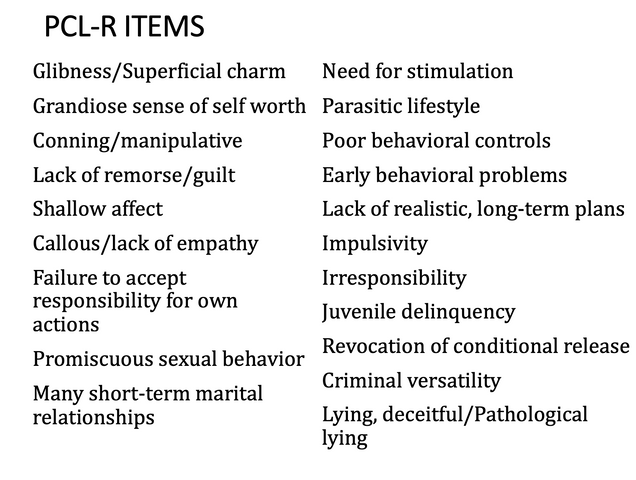Am I a psychopath?
The short answer: most likely no. While individuals can exhibit certain traits of psychopathy, there is more to the clinical assessment of this diagnosis. The term “psychopath” has become colloquial in its use. It is thrown around when a friend does something out of the norm, when a character on TV displays particular traits, and when describing actions that are atypical. These instances have made it seem that psychopathy is more common than it actually is. People can certainly fall under the umbrella of “psychopathy” but genuine, diagnosed psychopaths must meet specific criteria in order to be diagnosed as such.
Psychopathy, as noted by Rousseau (2023), can be caused by genetics, neurobiology, and abuse. It is defined by three major characteristics which include callousness, a fearless personality type, and impulse control issues (Marsh, 2022). Approximately 30% of the population demonstrate a degree of these traits, but only about 1.2% are classified as “severe psychopaths,” Marsh (2022) adds. In order to test for psychopathy, Robert Hare created the PCL-R

(Psychopathy Checklist-Revised) to measure the “extent to which [an] individual matches [a] prototypical psychopath” (Rousseau, 2023). This checklist consists of 20 items that are scored on a scale from 0-2; 0 means the item is not present and 2 means the item is definitely present. Rating each item a 0, 1, or 2, a score up to 40 can be obtained. Any score greater than 30 indicates severe psychopathy, which can only be “diagnosed” when administered by a professional with an advanced degree (Rousseau, 2023). While you can self-administer this test to get a general idea of where you stand, an accurate “diagnosis” can only come from a professional. “Diagnosis” is in air quotes here because psychopathy is not an official DSM diagnosis. Typically ASPD (Anti-Social Personality Disorder) is diagnosed, and in combination with a high PCL-R score, an individual is labeled to have psychopathic tendencies (Marsh, 2022).
Psychopathy can be viewed as a spectrum. Many individuals show psychopathic tendencies at one point or another and whether you have scored a 0, are in the early 20s, or maybe up in the 30s range, falling anywhere on the scale is not necessarily a bad thing. While yes, those with higher scores have an increased risk for criminal behavior due to the lack of empathy and guilt, psychopaths are not inherently bad individuals. Many are successful professionals who use their traits to their advantage. Being labeled a psychopath does not automatically lead to crime and violence; it all depends on how the traits are utilized in one’s life.
Treatments for psychopathy are extremely limited. Successfully curing psychopathy is not possible, but there are methods to manage symptoms and improve one’s quality of life. Treatments may include things like behavioral skills therapies, medications, and psychotherapy (Psychopathy Is, 2022). There tend to be additional challenges in treating psychopaths due to their lack of motivation, poor response to treatments, and resistance to any kind of change. These can stem from a psychopath’s lack of ownership of problems and responsibilities as well as their separation from emotions, empathy, and guilt. While psychopathy can be managed, it is more stringent to do so than with other kinds of diagnoses.
So, the question still stands: are you a psychopath? The probability of falling into that 1.2% is very low but never 0. You may exhibit several of the PCL-R items at either level 1 or even level 2, but the best way to get to the bottom of it is to see a licensed professional. This can start you on your path to figuring out why your brain may work differently than others and why you act and respond the way you do in certain situations. Either way, it’s all about how you use your personality and traits to your advantage while creating little to no destruction in your path. Change is not impossible and neither is living a successful, rewarding life.
References
Marsh, A. (2022, March). Why psychopathy is more common than you think, with Abigail Marsh, Phd. American Psychological Association. https://www.apa.org/news/podcasts/speaking-of-psychology/psychopathy#:~:text=Although%20severe%20psychopathy%20affects%20just,fall%20under%20this%20broad%20umbrella.
Psychopathy Is. (2022, December 21). Psychopathy Treatment Options. https://psychopathyis.org/treatment/#:~:text=The%20most%20successful%20approaches%20to,They%20may%20also%20incorporate%20medication.
Rousseau, D. (2023). Presentation files: Psychopathy. Boston University.